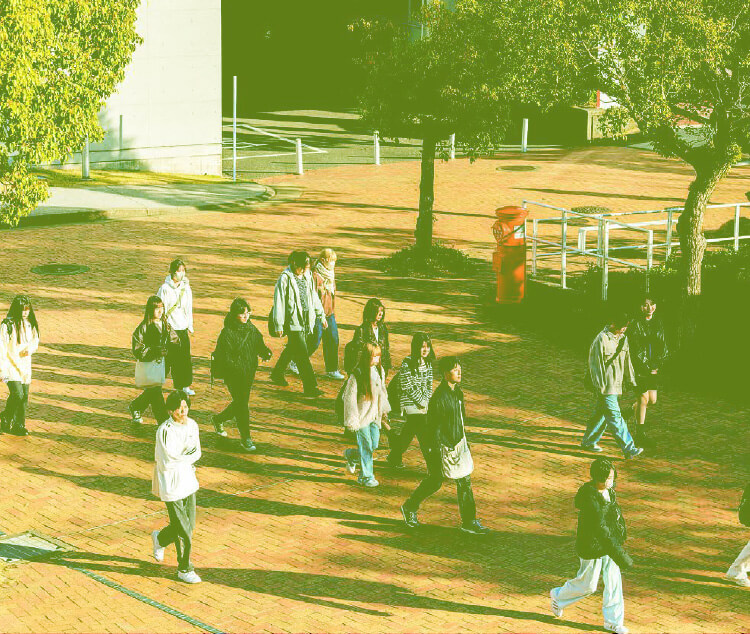Department of Information Science
Faculty of Science and EngineeringFor those who wish to enroll in 2026
For information on the 2026 curriculum, please see the latest university guide below.
Department News
What is Department of Information Science?
Information science will play a key role in realizing a super-smart society.
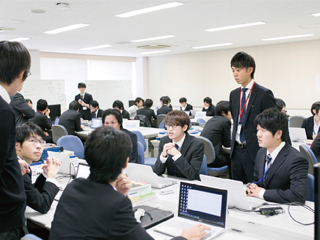
As we move towards the realization of a super-smart society, also known as "Society 5.0," a new society of the future, information and communication technology and mathematical information science are becoming more important than ever. In order to play an active role in the future as a person who supports the realization of a super-smart society and as a mathematics and information teacher who teaches the basic knowledge at junior and senior high schools, it is necessary to further develop the knowledge of mathematics and information science learned in high school. In Department of Information Science, we teach the knowledge and skills of mathematical information science, which is the foundation of information technology including programming and the field of artificial intelligence (AI), and cultivate human resources who can contribute to society.
Admission Policy
- 01
- People who have a strong interest in information technology and information mathematics
- 02
- Those who are highly motivated to acquire specialized knowledge in information science and actively seek to master new skills.
- 03
- Those who are interested in mechanical and electrical engineering based on the information field, who aim to engage in creative activities from a multifaceted perspective, and who wish to use the knowledge they have acquired to contribute to the local community.
Characteristics of the Department
01Information education through a variety of exercises
Programming courses start in the first year! Students will master information technology through full-scale app creation and a variety of exercises. Students will repeatedly study using a dedicated loan PC and lecture recording system.
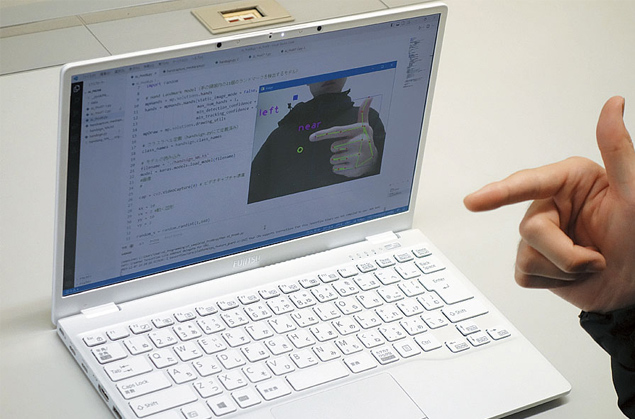
02 Practical research that satisfies curiosity
Students will take on a variety of themes, including smartphone app production, web system development, autonomous driving control, VR simulator development, AI applications, and big data utilization, and gain practical knowledge in information technology and information mathematics.
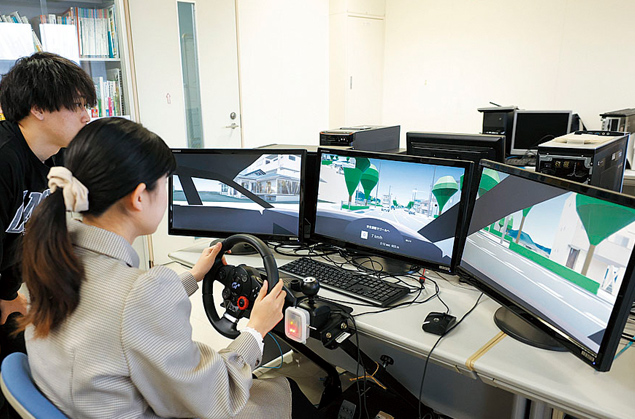
03 Activities supporting local transportation
In order to improve the convenience of local public transportation, we support many local governments in managing the operation of community buses and other local public transportation services by conducting usage surveys using apps and compiling data.
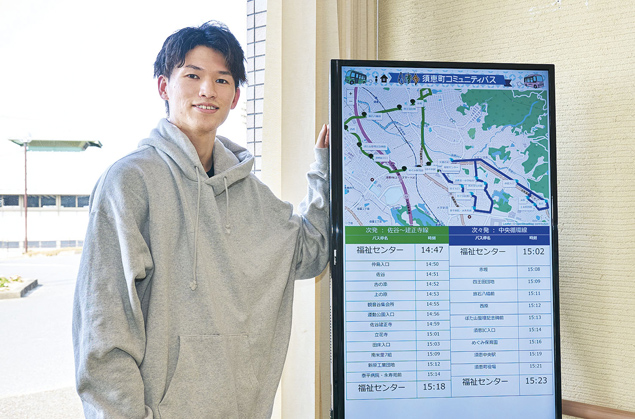
Advanced Program
A motivational support program!
Programming Skills "Visualization" Program
By participating in competitive programming, you can improve your programming skills and techniques. By receiving external evaluation and making your skills visible, you can gain an advantage in your job search.
- Special instruction for competitive programming
- Developing programming test skills for job hunting through competitive programming
- Top students aim to achieve an AtCoder rating of 400 or above, which will help them stand out in job hunting activities
*There is also the "University/Graduate School Step Support Program."
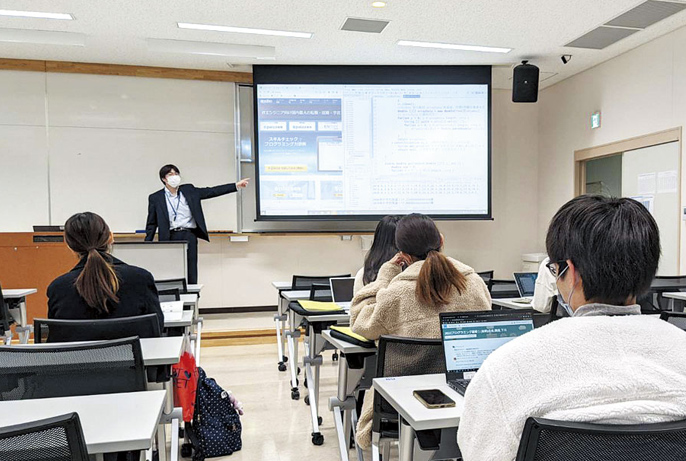
Four-year learning process
First year: A wide range of basic education
Students will learn basic knowledge and techniques of information science and develop logical thinking skills. After enrollment, students will choose a course.
Second year: Acquire expertise
You will solidify your basic professional skills in the fields of hardware, software, and information mathematics through lectures, exercises, and experiments.
Third year: Enhancing specialized knowledge
Students will acquire theories and practical skills related to cutting-edge information technology through lectures and exercises, and then begin full-scale research activities in each laboratory.
4th year: Activities for the future (employment and further education)
Students will work on their graduation research. Through research activities over the course of one year, they will develop their analytical skills, judgment, creativity, and communication skills, and acquire the ability to contribute to society.
Examples of subjects in Department of Information Science
Graduation Research
etc.
Select a course from the first year
-
Information Technology Courses
Acquire the basics of information technology and develop talent that can contribute to society
In this course, students learn software technologies such as programming and algorithms, hardware technologies such as computers and embedded systems, and network technologies. From the second year, students are divided into the "General Education Program" and the "Applied Education Program" to learn information technology practically.
- Example of lessons
- Information Literacy, Introduction to Programming, Programming Basics I, Programming Basics II, Basic Mathematics, Introduction to Mechanical Engineering, Introduction to Transdisciplinary Science and Engineering, Transdisciplinary Science and Engineering Basics, Design Engineering, Computer Architecture I, Data Structures and Algorithms I, Data Structures and Algorithms I Exercises, Programming Languages and Compilers, Operating Systems, Game Programming Exercises, Computer Architecture II, Hardware Design, Hardware Design II, Hardware Experiments I, Embedded Software Exercises, AI Programming Exercises, Information Processing Technology I, Information Processing Technology, Japanese Expressions, Computer Networks, Introduction to Electrical and Electronic Engineering, Transdisciplinary Science and Engineering Applications, Transdisciplinary Projects, Transdisciplinary Projects II
*You can also take subjects in the Information and Mathematics course. -
Information and Mathematics Course
Nurturing professionals who can apply mathematics and information
In this course, students will learn traditional mathematics such as calculus, linear algebra, and probability and statistics to gain a solid mathematical foundation, and will also study information mathematics, a field of mathematics that has developed alongside computers, such as discrete mathematics, to gain a theoretical understanding of information science.
- Example of lessons
- Students can also take courses in the Information Literacy, Introduction to Programming, Discrete Mathematics I, Discrete Mathematics II, Programming Basics I, Programming Basics II, Basic Mathematics, Linear Algebra I, Linear Algebra II, Calculus, Computer Configuration I, Basic Physics, and Information Technology. Data Structures and Algorithms I, Discrete Mathematics III, Discrete Mathematics IV, Probability and Statistics, Elementary Geometry, Statistics, Vector Analysis, Calculus II, Differential Equations, Physics, Information Theory, Introduction to Neural Networks, Data Analysis Exercises, and Computer Graphics Basics
*You can also take subjects in the Information and Mathematics course.
Class Pickup
Hardware design, production and evaluation
Learn the basics of hardware through
Hardware Experiments | Professor Yoshihiro Yasutake
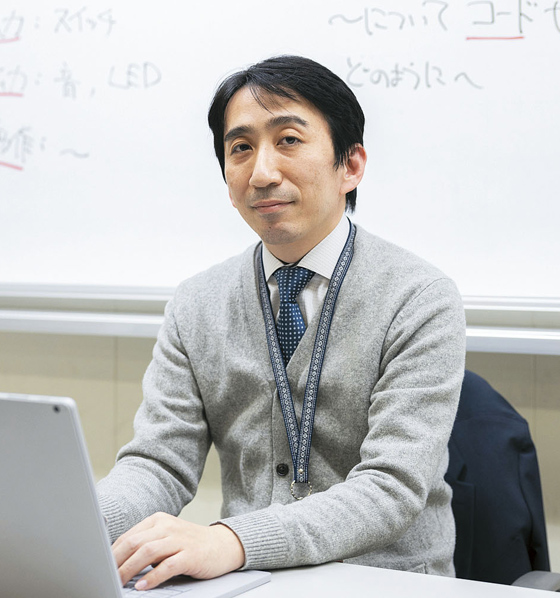
Students will learn the basics of hardware through designing, building, and evaluating hardware. Specifically, students will learn classical hardware design methods using integrated circuits (TTL-IC), cutting-edge hardware design methods using LSI integrated development tools on computers, and system design methods using embedded software, for which hardware knowledge is essential. By developing a digital system with the same specifications using three design methods, students will understand the characteristics of each design method and acquire the skills to use each design method.
Simulation, audio and image processing,
Learn the numerical analysis required for artificial intelligence
Numerical Analysis | Professor Kenichi Ishida
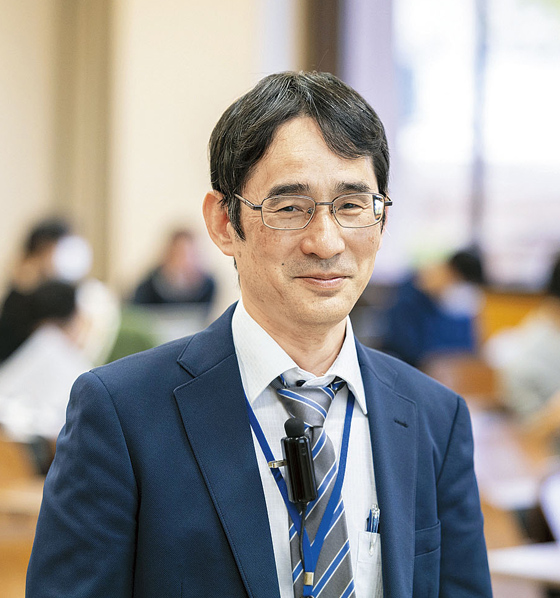
In this class, you will learn how to solve problems using numerical calculations. The laws necessary for engineering design and elucidating natural and social phenomena are expressed as equations that include differentials, integrals, vectors, and matrices. If the equation has many variables or is complex, it is difficult to find a solution by transforming the equation. Therefore, a method is required to calculate differentials and integrals by adding, subtracting, multiplying, and dividing numerical values to find an approximate solution. Advances in computers have made it possible to perform many calculations at high speeds. It has become a necessary analytical method in many fields, including simulation, audio and image processing, and artificial intelligence.
Seminar Pickup
Yoshihiro Yasutake Seminar
Learn about autonomous robots
Contest Winner
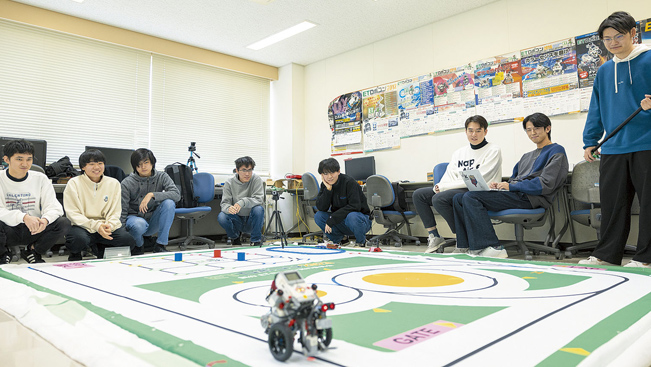
In our research into autonomous driving robots, we are working on robot control and image processing using artificial intelligence technology. For example, we proposed a model of the recognition method required for a robot to drive, and evaluated machine learning based on that model using actual equipment and simulations. As a place to put these results into practice, we participated in the ET Robocon hosted by the Japan Embedded Systems Technology Association (JASA), and in 2023 we won third place at the national competition.
Through ET Robocon and other events, I learned the importance of cooperation, adaptability, and communication in team development. It was interesting to consult with other members and go through a process of trial and error to get the robot to work properly.
Yusei Munakata, 3rd year
Izumi High School/Kagoshima
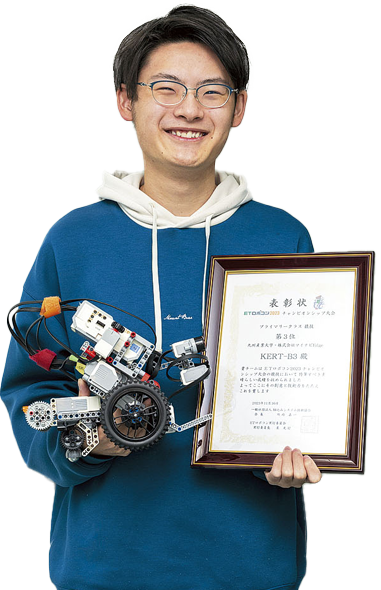
Koichiro Tanaka Seminar
Create a smartphone app
Resolving local community issues
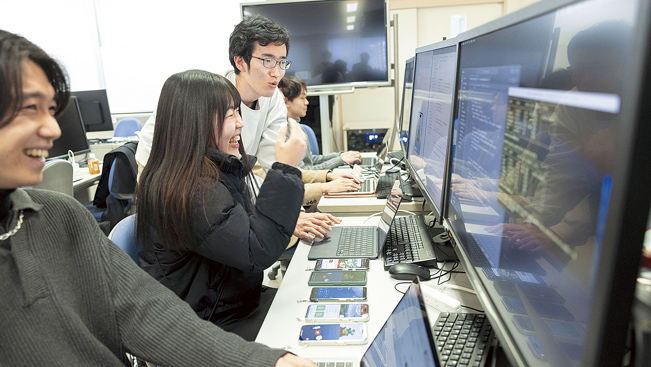
As we move into an age where everyone has a smartphone, have you ever wished there was an app like this? In this seminar, students are provided with the opportunity to create the apps they want. Specific examples include "Marine World," "KSU," "Akamura," "JR Kyushu Kashii Line," and "Munakata Video Survey." These are apps that were developed and released by seminar students in collaboration with students from other faculties at the university to address issues in the local community.
When creating an app, we consider whether to use Android or iPhone or both, whether a server is necessary, whether to use hardware, etc. Together with my seminar students, I challenge myself to "make what doesn't exist!" and enjoy developing in collaboration with Faculty of Art and Design.
Yoshiki Mizuno, 3rd year
Kyushu Sangyo University Kyushu High School/Fukuoka
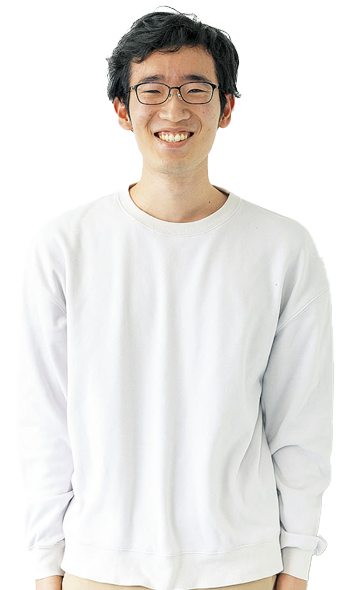
Qualifications and career path data
Qualifications to aim for
- ■ Junior high school teacher license (mathematics)
- ■High school teacher license (mathematics/information)
- ■ Professional Engineer (Exempt from the first examination)
- ■ Curator
- ■Social educator (training course)
- ■ Information Security Management
- ■Basic information engineer
- ■ Applied information technology engineers, etc.
Industry Graph

Main Employment Destinations
Softbank Corp./TOPPAN Corp./Yamada Holdings Co., Ltd. (Yamada Denki)/FUJISOFT Co., Ltd./ITOCHU Techno-Solutions Corp./QTnet Inc./NTT Comware Corp./Fujifilm Business Innovation Corp./Gcom Holdings Corp./NEC Networks & System Integration Corp./NTT Facilities Inc./Hitachi Industrial Control Solutions Corp./Mitsubishi Electric Software Corp./Toshiba Digital Engineering Corp./Canon Argos Logic Corp./Fukuoka Bank Ltd./Saga Bank Ltd./OKEN Co., Ltd./NTT Data Kyushu Corp./Seibu Gas Information Systems Co., Ltd./Nishitetsu Information Systems Co., Ltd./Fukuoka Prefectural Government (Police Administration and Information Processing)/Fukuoka City Junior High School Teachers/Fukuoka Prefectural Kasumigaoka High School
Graduate Interview
Toranosuke Ohkubo
Kasumigaoka High School/Fukuoka
- Employment
- QTnet Inc.
QTnet is conducting joint research with Kyushu Sangyo University on local 5G, and it was a company I felt very close to since my time at university. I would like to be involved in building infrastructure facilities that will become indispensable in the future in Fukuoka, where I was born and raised.
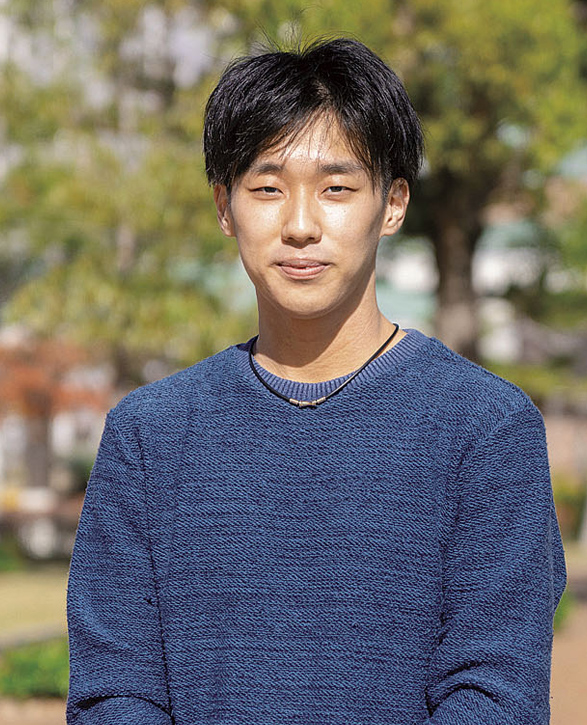
Marina Furusato
Kagoshima High School/Kagoshima
- Employment
- NTT DATA KYUSHU CORPORATION
I applied because I was attracted to the company's innovative solutions in a wide range of fields, including corporations, finance, and the public sector (education). I would like to use the power of IT to solve the problems faced by customers in a wide range of industries and make Kyushu a more vibrant and interesting city.
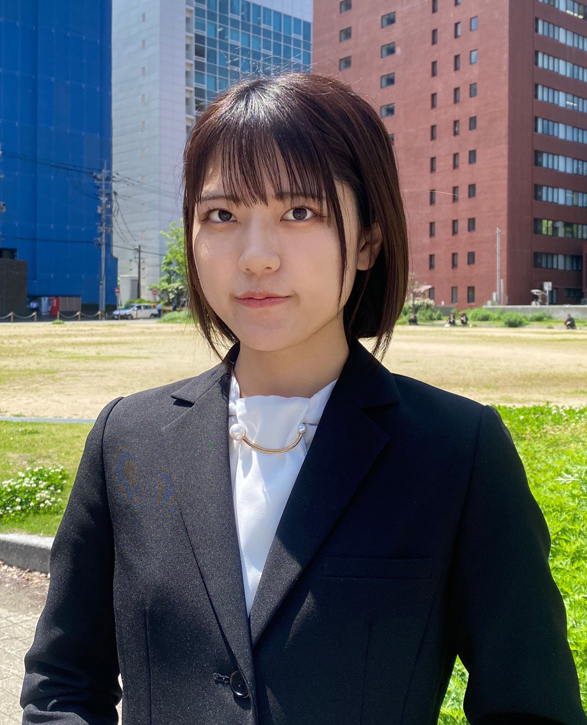
Haruka Karakawa
Kyoto High School/Fukuoka
- Destination
- Kyushu Sangyo University University Graduate Graduate School of Information Science
Through research activities in the department, I realized how limited my current knowledge was, and I wanted to gain more advanced knowledge and skills, so I decided to go to graduate school. My dream for the future is to create applications and systems that are useful to many people.
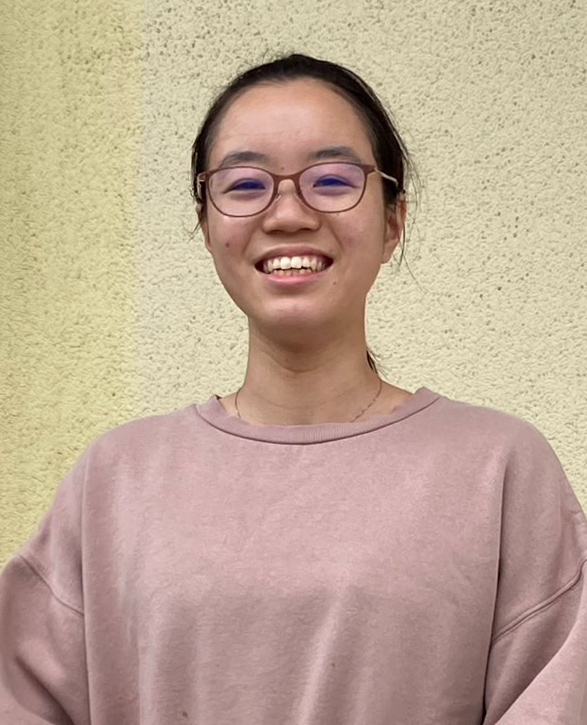
If you cannot view PDF files, please download Adobe Reader.

